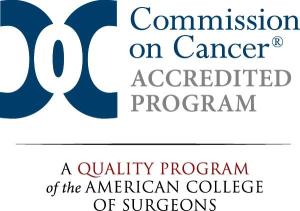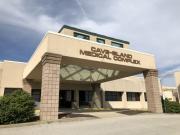Colorectal Cancer
A colorectal cancer diagnosis can be overwhelming. But you aren’t alone. Our caring team of cancer experts is ready to support you every step of the way. As an accredited Comprehensive Community Cancer Program by the Commission on Cancer of the American College of Surgeons, we offer nearly all the same options and technology you’d find at an academic medical center, just close to home.

Our multidisciplinary care team will work to develop a treatment plan that’s personalized to you—designed around your specific condition, personal preferences and treatment goals. We’ll treat your colorectal cancer holistically, caring not just for your physical health, but your mental and emotional health, too.
Colorectal Cancer Symptoms
Colorectal cancer may not cause symptoms, especially when it hasn’t advanced, but if it does, it may cause you to experience one or more of the following:
- Blood in the stool
- Cramping or stomach pain
- Diarrhea, constipation or other bowel changes that last for several days
- Rectal bleeding with bright red blood
- Unintentional weight loss
- Weakness and fatigue
Colorectal Cancer Risk Factors
A risk factor is something that raises your risk for developing a certain type of cancer. Some, like those related to genetics, you can’t change. But others, like risk factors related to lifestyle, you can. Many risk factors for colorectal cancer are linked to lifestyle.
Risk factors for colorectal cancer include:
- Alcohol use
- Being older than 50
- Being overweight or obese
- Certain types of diets, such as those high in red and processed meats
- Having a family history of colorectal cancer or adenomatous polyps (the kind of polyps that can grow into cancer)
- Having an inherited syndrome like Lynch syndrome
- Having a personal history of colorectal polyps or colorectal cancer
- Having a personal history of inflammatory bowel disease, such as Crohn’s
- Having Type 2 diabetes
- Not being physically active
- Smoking
- Your racial and ethnic background (Black Americans, for example, have the highest colorectal cancer incidence and mortality rates in the United States)
Colorectal Cancer Types
Colorectal cancer can begin in either the colon or the rectum. The majority of colorectal cancers are adenocarcinomas, which is cancer of the cells that line the inside tissue of the colon and rectum.
Less common types of colorectal cancer include:
- Gastrointestinal carcinoid tumors
- Gastrointestinal stromal tumors
- Leiomyosarcomas
- Primary colorectal lymphomas
Diagnosing Colorectal Cancer
Finding cancer early, when it’s smaller and easier to treat, helps improve outcomes. That’s why screening for colorectal cancer is so important.
The American Cancer Society recommends people who are at average risk for the disease (meaning they don’t have a personal or family history of cancer, a colorectal cancer syndrome or an inflammatory bowel disease) start regular screenings at age 45 and continue them at least through age 75.
People at a higher risk for colorectal cancer may need to start screenings earlier, go for screenings more often and get certain, specific tests.
There are several tests we use to help diagnose colorectal cancer, including flexible sigmoidoscopy and fecal immunochemical tests (FIT), but colonoscopies remain the gold standard. That’s because they’re the most sensitive at detecting even small polyps, precancerous polyps and cancer. Colonoscopies also let our providers remove lesions during an exam whenever possible.
What is Colorectal Cancer?
The colon and rectum make up the large intestine, which plays an important role in processing waste as part of the body’s digestive system. Colorectal cancer, which develops when cells in the tissues of the colon or rectum start to grow out of control, is the third most common cancer diagnosed in the United States (not counting skin cancer).
Most of the time, colorectal cancer begins as a polyp—a noncancerous growth that may develop on the inner wall of the colon or rectum. And if polyps aren’t treated or removed, they can grow into cancer. That’s why finding and removing precancerous polyps is critical to preventing colorectal cancer.
Treating Colorectal Cancer
Our multidisciplinary cancer team will work together to create a treatment plan that’s tailored to you. Your team may include a medical oncologist, radiation oncologist, gastroenterologist and surgical oncologist, but you may consult with others during treatment, as well, such as dietitians, counselors and nurse practitioners. It may also include a nurse navigator who can guide your care from diagnosis through survivorship.
Your Navigator Can Help You:
- Communicate with your doctor, surgeon and other care team providers
- Find community support and resources
- Learn more about your colon cancer and understand your treatment options
- Make medical appointments
Here, We Treat Colorectal Cancer With:
- Chemotherapy, targeted therapy and immunotherapy are also often used to treat colorectal cancer. Sometimes, they’re given before surgery (called neoadjuvant therapy) to reduce the size of a tumor or destroy as many cancer cells as possible, and other times, they’re given after surgery (called adjuvant therapy) to eliminate any remaining cancer cells.
- Radiation therapy is commonly used to treat cancer that develops in the rectum because it tends to recur in the same place.
- Surgery is the most common treatment for colorectal cancer. It’s used to remove the tumor and affected surrounding tissue.

















